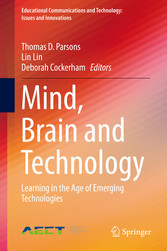As technology becomes increasingly integrated into our society, cultural expectations and needs are changing. Social understanding, family roles, organizational skills, and daily activities are all adapting to the demands of ever-present technology, causing changes in human brain, emotions, and behaviors. An understanding of the impact of technology upon our lives is essential if we are to adequately educate children for the future and plan for meaningful learning environments for them.
Mind, Brain and Technology provides an overview of these changes from a wide variety of perspectives. Designed as a textbook for students in the fields and interdisciplinary areas of psychology, neuroscience, technology, computer science, and education, the book offers insights for researchers, professionals, educators, and anyone interested in learning more about the integration of mind, brain and technology in their lives. The book skilfully guides readers to explore alternatives, generate new ideas, and develop constructive plans both for their own lives and for future educational needs.
Thomas D. Parsons, PhD, is a Clinical Neuropsychologist and Associate Professor of Psychology at the University of North Texas. Prior to joining the faculty at UNT, he was an Assistant Professor and Research Scientist at the University of Southern California's Institute for Creative Technologies. His work integrates neuropsychology and simulation technologies for novel assessment, modeling, and training of neurocognitive and affective processes. He is a leading scientist in this area and he has directed 17 funded projects during his career and he has been an investigator on an additional 13 funded projects. In addition to his patents for the eHarmony.com Matching System, he has invented and validated virtual reality-based assessments of attention, spatial abilities, memory, and executive functions. He uses neural networks and machine learning to model mechanisms underlying reinforcement learning, decision making, working memory, and inhibitory control. In addition to his three books, he has over 100 publications in peer reviewed journals and book chapters. He is currently Co-PI (in partnership with Soar Technology) on a Department of Defense funded ($998,888) grant that aims to develop an artificially intelligent cognitive architecture for neurocognitive assessment. He has served as Associate Editor for Frontiers in Human Neuroscience and the editorial boards of Psychological Assessment; Cyberpsychology, Behavior, and Social Networking; Assessment (Sage); and PsycCRITIQUES. His contributions to neuropsychology were recognized when he received the 2013 National Academy of Neuropsychology Early Career Achievement award. In 2014, he was awarded Fellow status in the National Academy of Neuropsychology.
Lin Lin, Ed.D., is an Associate Professor of Learning Technologies at the University of North Texas. Lin's research looks into interactions between the mind, brain, and technology in complex learning environments. She has conducted research on 1) media multitasking; 2) learning in online, blended, and virtual/augmented reality environments. Lin has published over 30 refereed articles in journals including the Proceedings of the National Academy of Sciences (PNAS) of USA, Educational Technology Research and Development (ETR&D), and Computers and Education in addition to a dozen book chapters and over 60 conference papers. Lin recently completed co-editing a book with Dr. Mike Spector to be published in the summer of 2017 by Routledge. The book focuses on the constructive articulation between learning sciences and instructional technology communities. She is currently co-editing another book focusing on innovative instructional design approaches. Lin serves as the Associate Director of Texas Center for Educational Technology (TCET), and Co-Director of a Joint-Lab on Big Data, Little Devices, and Life-long Learning. She is Associate Editor for the International Journal of Smart Technology and Learning (IJSmartTL) as well an editorial board member of several other peer-reviewed journals. Lin received her doctoral degree in Instructional Technology and Media at Teachers College, Columbia University.
Deborah Cockerham, managing director of the Research and Learning Center at the Fort Worth Museum of Science and History, also serves as Visiting Research Scholar at Texas Christian University's Center for Science Communication. In these roles, she works to strengthen interdisciplinary communication and build connections between research scientists and the public, and has supported multiple research university collaborations in public education and communication. In earlier work as a learning disabilities specialist, she taught children and adolescents with a variety of learning and attentional differences. Her work with students who have attention deficit hyperactivity (ADHD) and/or autism spectrum disorder (ASD) has focused on social learning, based on connections between communication skills and the fine arts. Cockerham's research takes place at the intersection of learning technologies, psychology, education and communication. Recent investigations include EEG studies on ASD interpretation of nonverbal emotional cues, and behavioral studies focused on media multitasking and technology addiction. Cockerham has presented practitioner workshops at venues that include the International Learning Disabilities Association, the National Council of Teachers of Mathematics, Colorado Dyslexia Center, Association of Texas Educators, Texas Learning Disabilities Association, Association of Science and Technology Centers, the Association of Texas Professional Educators. In addition, she has presented papers at the International Conference on Advanced Learning Technologies and the American Educational Research Association, and has publications in Technology, Knowledge, and Learning, and Zeitschrift f?r Psychologie. She is a graduate of the University of Texas at Arlington's Masters of Mind, Brain, and Education. Through her work and studies, Cockerham focuses on developing community-based collaborations that build skills for lifelong learning.









